Ever wonder how your childhood experiences shaped you as an individual? Our childhood has a really strong impact in our adult lives and most of the time we don’t even realize how deep this impact is. While positive childhood experiences can boost our self-esteem and confidence, negative and traumatic experiences can lead to serious mental illness. Let’s explore the different mental disorders caused by childhood trauma.
Childhood is an important part of our lives as it strongly influences our physical, mental and emotional development. However, it is also a period when we can become vulnerable to traumatic experiences that can wreak havoc on our mental well-being.
Today, let us explore the complex relationship between mental illness and childhood trauma and learn “how can childhood trauma affect mental health?”, while exploring childhood trauma symptoms in adulthood and the mental disorders caused by childhood trauma. So let’s dive in.
What is Childhood Trauma?
Childhood trauma refers to severe negative experiences during childhood (before the age of eighteen). Such experiences, also known as Adverse Childhood Experiences (ACEs), may include –
- Abandonment
- Neglect
- Maltreatment
- Violence
- Assault
- Bullying
- Exploitation
- Physical, emotional and/or sexual abuse
- Household dysfunction or domestic violence
- Experiencing natural disasters
- Living in a war zone
- Terrorism
- A serious accident or motor vehicle accident
- Witnessing parental drug abuse
- Death of a parent
- Learning about trauma experienced by a friend or relative
- Community violence
Such traumatic events may take place within the home, school, institutes, healthcare settings or in the community.
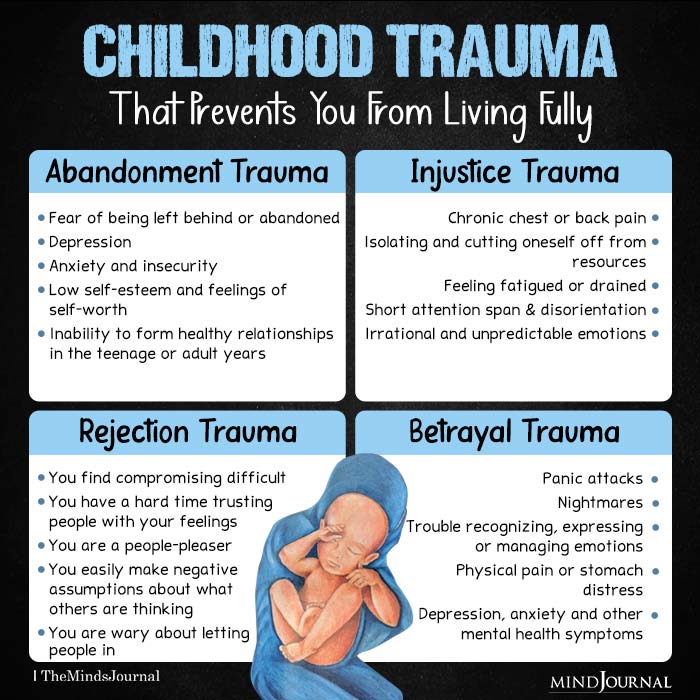
“Childhood trauma is defined according to the Diagnostic and Statistical Manual of Mental Disorders IV and V as exposure to actual or threatened death, serious injury, or sexual violence,” explains a 2015 study.
Related: 8 Types Of Childhood Trauma And How To Defeat And Heal From Them
A child may become overwhelmed and scared after experiencing or witnessing traumatic events and this can lead to serious negative effects on their psychological, physiological, and sociological well-being.
In fact, when left unaddressed, childhood trauma can lead to the development of different psychological disorders that can persist into adulthood and affect their careers, personal lives and relationships.
This is why it is crucial to understand how can childhood trauma affect mental health and the different mental disorders caused by childhood trauma.
Relationship between Mental Illness and Childhood Trauma
Extensive research has revealed a significant association between mental illness and childhood trauma. Experiencing traumatic events in childhood can disrupt and impair the brain’s healthy development and can also negatively affect cognitive, emotional & social functioning.
This can make the child vulnerable to developing different mental illnesses, like anxiety disorders, depression, borderline personality disorder, post-traumatic stress disorder (PTSD) and even substance use disorders.
A recent 2023 study has found that individuals who have experienced childhood trauma tend to have higher rates of depressive and anxiety symptomatology compared to those without any history of childhood trauma.
“Childhood trauma, emotional or physical adverse experiences in one’s early life, was associated with increased risk for developing almost all mental disorders, including sleep disorders, depression, anxiety, bipolar disorder, PTSD, and schizophrenia,” explain researchers.
How Childhood Trauma Can Affect Mental Health
Before we delve into the different mental disorders caused by childhood trauma, let us understand how can childhood trauma affect mental health. Here are a few factors that we need to consider –
1. Altered Brain Development
Childhood trauma can change the development of the brain. Consistent stress and trauma can interrupt the normal growth of different brain areas responsible for controlling emotions, processing memory, and reaction to stress.
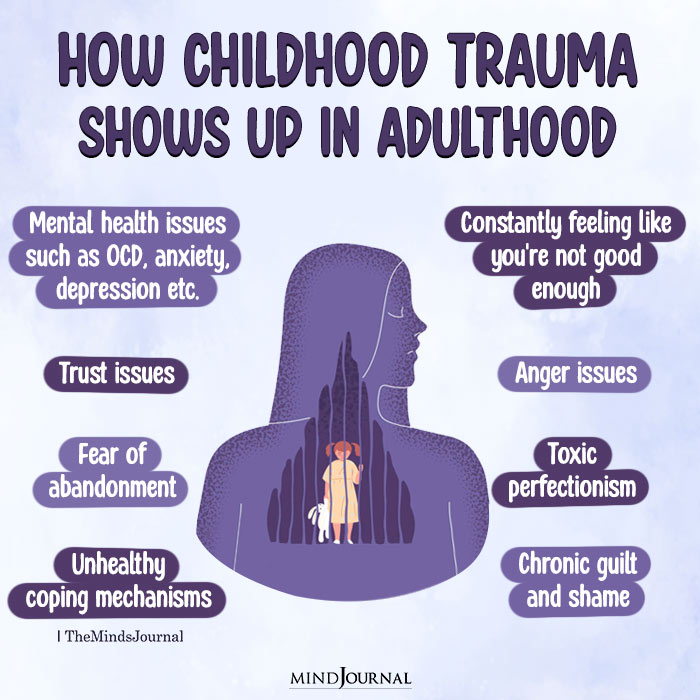
These changes might cause problems with emotional control, distorted functioning of memories and a heightened response to stress.
2. Emotional Dysregulation
Traumatized children may have difficulty regulating their emotions. They may exhibit overwhelming or unpredictable affective responses, have trouble expressing feelings before others or become emotionally unresponsive.
During adulthood, these difficulties in emotional regulation can strongly persist and lead to mood disorders, such as bipolar disorder and depression.
Related: 7 Alarming Signs You Are in Trauma Denial and How to Recover From It
3. Impaired Social Functioning
Childhood trauma may hinder a child’s capacity to develop secure attachments and cultivate healthy relationships. Trauma impairs the development of trust, empathy, and social skills.
Hence, individuals who grew up with childhood trauma tend to face difficulties in building and keeping healthy and positive relationships, which often results in feelings of isolation and loneliness.
4. Hypervigilance and Anxiety
Being exposed to traumatic experiences in your childhood can increase your sense of threats and danger, leading to hypervigilance. For instance, most survivors of childhood trauma experience intense fear, and are continuously anxious & restless, are highly cautious and sensitive to potential threats.
This state makes people with a traumatic childhood prone to developing anxiety disorders, like generalized anxiety disorder and panic disorder. This is the answer to “how can childhood trauma affect mental health?”
5. Maladaptive Coping Mechanisms
Children who go through trauma can develop harmful coping mechanisms like self-harm, substance abuse or eating disorders as a way to control their intense emotions.
Unfortunately, these patterns can continue even into their adulthood, which can increase the risk of developing psychiatric disorders, such as addiction and eating disorders.
Childhood Trauma Symptoms in Adulthood
The effects of childhood trauma can manifest in various ways during adulthood. Some of the most common childhood trauma symptoms in adulthood typically include:
1. Flashbacks and Intrusive Memories
Adults who have experienced trauma may have vivid and distressing memories of the traumatic event. These memories can resurface as flashbacks or intrusive thoughts, causing significant distress and interfering with daily functioning.
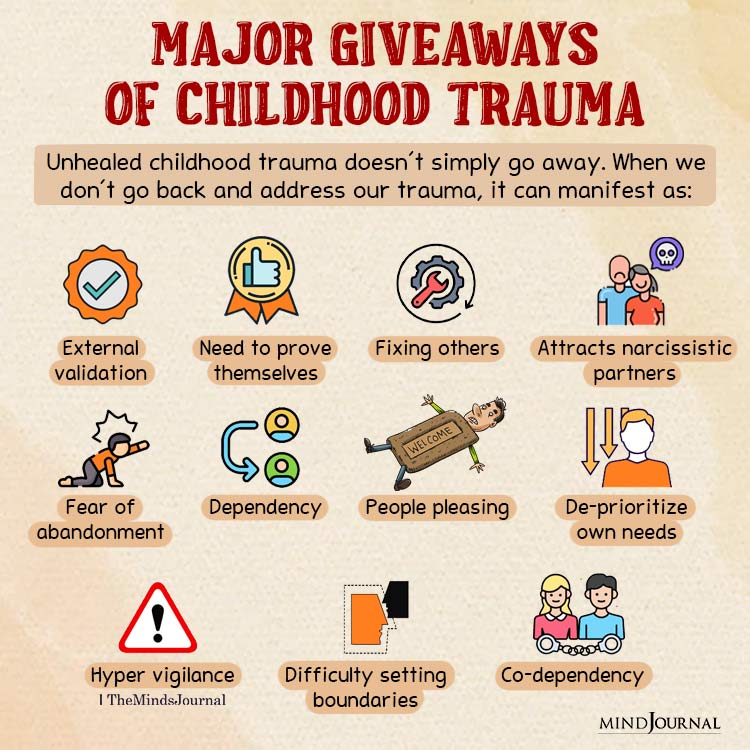
2. Emotional Instability
Childhood trauma survivors may experience frequent mood swings, emotional outbursts, or difficulty managing their emotions. These emotional disturbances can be a result of unresolved trauma and can significantly impact their quality of life.
3. Self-Destructive Behaviors
People who have experienced trauma in their early years may engage in self-destructive behavior or self-harm as a way of dealing with their psychological and emotional pain.
Such behaviors may include self-inflicted injuries, engaging in risky sexual encounters or reckless and impulsive actions. This is one of the major childhood trauma symptoms in adulthood.
4. Relationship Difficulties
Trauma in childhood impairs and disrupts the survivor’s ability to create a healthy, positive and loving relationship. They may have trust issues, an inability to set healthy boundaries, and difficulty being vulnerable and intimate.
Related: How Does Childhood Trauma Affect Relationships? Shattered Innocence, Fragile Bonds
5. Physical Health Problems
While childhood trauma has lasting mental health effects, it can also have significant and serious physical health issues such as chronic pain, gastrointestinal issues, cardiovascular problems and autoimmune diseases.
Mental Disorders Caused by Childhood Trauma
Multiple studies have established that childhood trauma is closely related to mental health issues. Although not every child who has experienced abuse will develop a psychological condition in adulthood, trauma in early years can surely be a contributing factor in the development of mental health disorders.
Here are some common mental disorders that are commonly related to childhood trauma:
1. Post-Traumatic Stress Disorder (PTSD)
Experiencing or witnessing traumatic events, like abuse, maltreatment, neglect, or violence, as a child can often lead to PTSD as an adult. According to a 2017 study, “Of those children and adolescents exposed to trauma, about 16% will develop PTSD.”
PTSD symptoms can include intrusive memories or flashbacks of the traumatic event, avoidance of reminders of the trauma, negative thinking, mood shifts and hyperarousal (being on high alert).
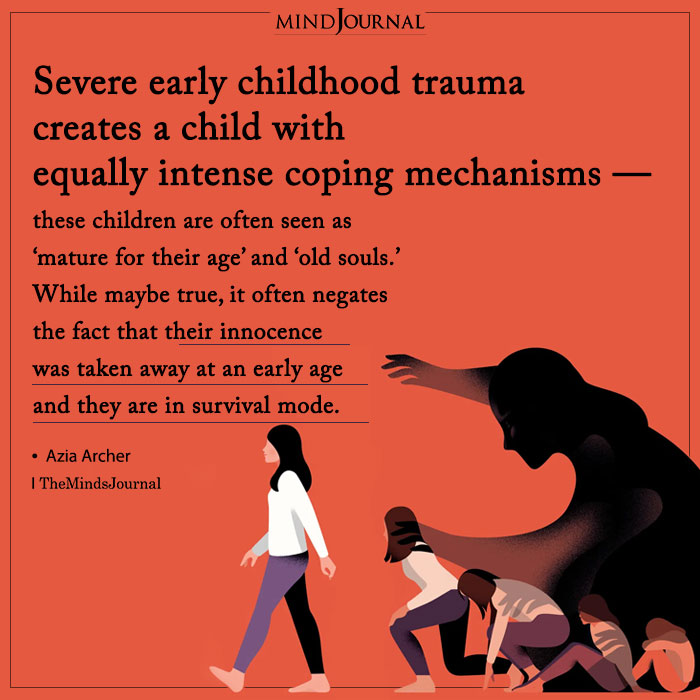
2. Depression
Childhood trauma makes one vulnerable to developing depression as an adult. Traumatic experiences may interfere with brain chemistry and result in alterations of neurotransmitters that control our mood.
Researchers have found that about “75.6% of the chronically depressed patients reported clinically significant histories of childhood trauma.” Moreover “37% of the chronically depressed patients reported multiple childhood traumatization.”
This can lead to severe loss of interest in activities enjoyed earlier, sadness, emotional pain and a lack of self-worth.
3. Anxiety Disorders
Childhood trauma can often lead to anxiety disorders such as generalized anxiety disorder, social anxiety disorder, panic disorder etc.
Trauma in early years “impacts the functioning of the brain, mind, and body, which together may contribute to a higher vulnerability for affective disorders,” and “a higher risk of anxiety and depressive disorders,” explains a 2021 study.
People who have experienced traumatic events during their childhood may be very watchful, hyper-vigilant and have a heightened startle response.
4. Borderline Personality Disorder (BPD)
BPD is a complicated mental condition marked by unstable moods, relationship problems, impulsivity and a poor self-image. Someone can experience disrupted emotional regulation abilities and unstable relationships due to childhood trauma.
Researchers have found that a diagnosis of BPD is associated with “child abuse and neglect more than any other personality disorders, with a range between 30 and 90% in BPD patients.”
Related: How Childhood Trauma Secretly Creates Narcissists
5. Substance Use Disorders
Being exposed to trauma from an early age is strongly associated with suffering from substance use disorders such as drug addiction and alcoholism. According to a 2012 study, “Early-childhood trauma is strongly associated with developing mental health problems, including alcohol dependence, later in life.”
The study explains that individuals with childhood trauma “may use alcohol to help cope with trauma-related symptoms.”
Researchers found that in people exposed to traumatic experiences, especially those occurring in childhood, “high rates of lifetime dependence on various substances were found (39% alcohol, 34.1% cocaine, 6.2% heroin/opiates, and 44.8% marijuana).”
While using substances can offer some temporary solace, it can result in a lifetime of dependence and addiction. This is one of the most damaging mental disorders caused by childhood trauma.
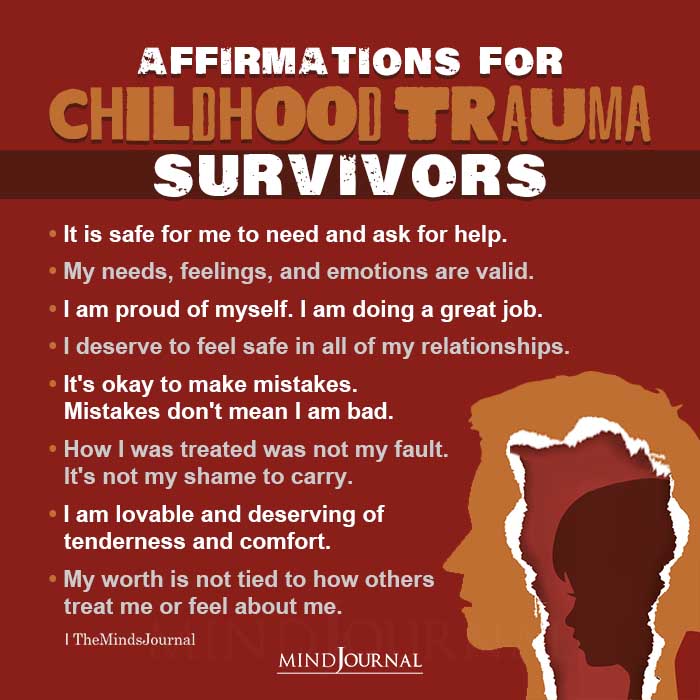
Apart from these psychiatric conditions, there are some other mental disorders that can occur due to childhood trauma, such as –
6. Dissociative Disorders
Dissociative disorders include disruptions in one’s memory, awareness, identity, or perception of the world or oneself.
7. Eating Disorders
Bullying, neglect or body shaming in childhood can impair one’s body image and self-worth and result in anorexia nervosa, bulimia nervosa, or binge-eating disorder.
8. Attention-Deficit/Hyperactivity Disorder (ADHD)
Although ADHD is primarily considered a neurodevelopmental condition with genetic origins, some researches indicate that early trauma might have a role in bringing out or worsening ADHD symptoms.
9. Conduct Disorder
Impulsivity, emotional dysregulation and social dysfunction may develop due to traumatic experiences in children who go on to develop conduct disorder.
10. Schizophrenia
Though the exact causes of schizophrenia remain unknown, there is evidence that suggests childhood trauma may increase the risk for this debilitating mental illness.
Related: Inner Child Work: 5 Ways To Heal The Different Types Of Childhood Trauma
11. Personality Disorders
Certain personality disorders including Antisocial Personality Disorder and Avoidant Personality Disorder may be influenced by childhood trauma.
It’s important to note that while childhood trauma can increase the risk of developing these mental disorders, not everyone who experiences trauma will develop a mental illness.
Each individual’s response to trauma is unique, and various factors, such as resilience, social support, and access to appropriate treatment, can influence outcomes.
Takeaway

Childhood trauma can have a really strong impact on our emotional and mental well-being. It impairs the natural and normal growth of a child and can lead to different psychological conditions.
This is why it is important that we understand the relationship between mental illness and childhood trauma, how can childhood trauma affect mental health and the different mental disorders caused by childhood trauma. As knowledge is true power, the more we learn and understand, the better we will be able to cope with.
If you or someone you know has experienced childhood trauma and is struggling with mental health challenges, reaching out to a mental health professional can provide the necessary support and guidance for recovery.
Remember, it is never too late to seek help and support.
Related: 10 Ways To Overcome Childhood Trauma: Grow Beyond Your Childhood Trauma And Reclaim Your Life
Frequently Asked Questions (FAQs):
How does childhood trauma lead to mental illness?
Childhood trauma can lead to multiple psychiatric disorders by altering brain structure, negatively affecting healthy development, & adversely impacting coping mechanisms.
How do childhood experiences affect mental health?
Adverse childhood experiences can affect one’s mental health by influencing emotional regulation, neural pathways, and creating the base for mental well-being in adulthood.
What are the long term effects of early childhood trauma?
Long-term effects of trauma in early childhood involve increased risk of mental disorders, unstable relationships, and difficulties in emotional regulation.

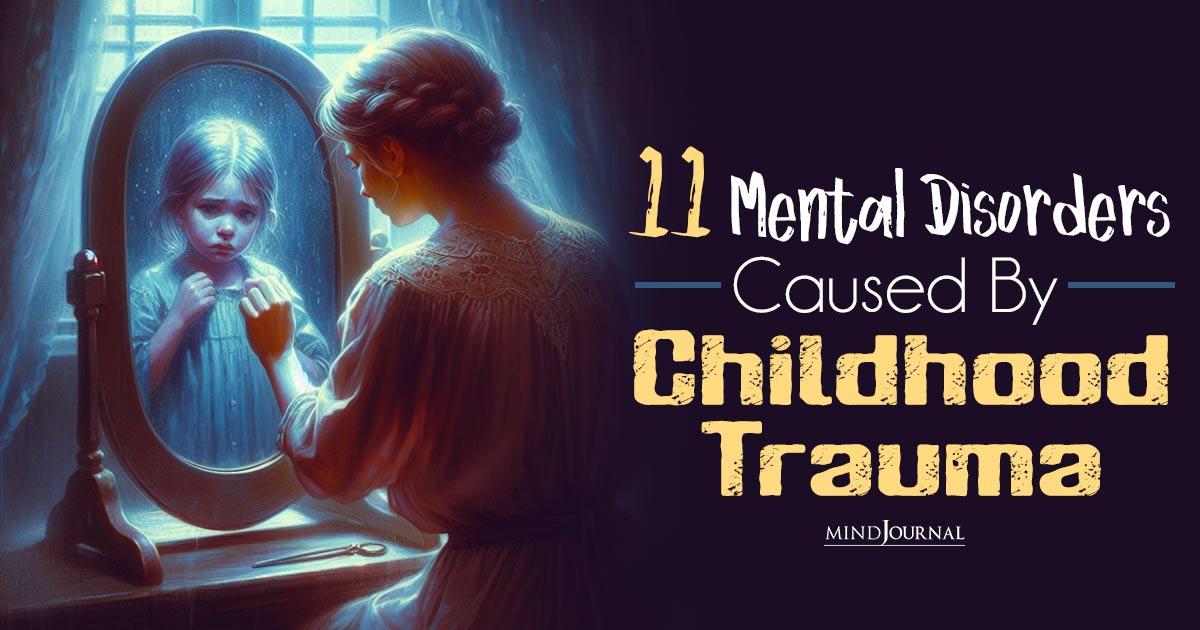







Leave a Reply